Human Resource Development
GAN Learning Centre has organized a variety of training and workshops for both organizations and individuals, employing diverse approaches and modalities tailored to the needs of the participants. These have included on-the-job training, hybrid formats
(combining online and in-person sessions), as well as residential and non-residential courses, depending on the nature and objectives of the program.
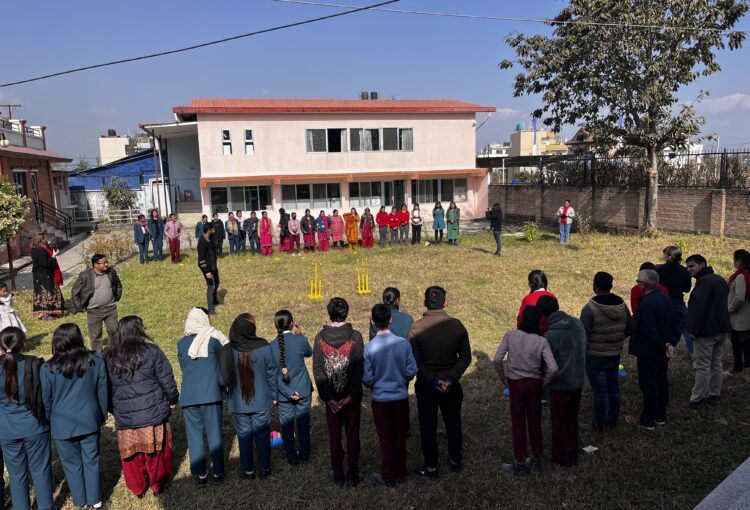
1. Hybrid Teacher Training
Gan Research and Learning Resource Center organized 4 days hybrid professional development of Head/Teachers for 21st Century training in December 2023 and January 2024 in collaboration with Aussie Action Abroad, Global Action Nepal and Lalitpur Metropolitan City ward number 22. 15 head teachers and teachers were participated in the training. Facilitators for the training
were from Australia and Nepal.
2. Teachers Mobile Clinic
Teachers’ Mobile Clinic is one of the flagship and innovative initiatives of Gan Research and Learning Resource Centre and it has been successfully implemented across its Global Action Nepal’s project locations. This model serves as a platform for collaborative learning among teachers, focusing on key aspects such as teaching-learning environments, student performance, and classroom attendance.
A unique feature of the Teachers’ Clinic is its emphasis on practical, classroom-based strategies—including the development and use of low-cost or no-cost local materials, and effective classroom setup to enhance student engagement. Teachers actively share experiences and ideas about the materials they have introduced in their classrooms and reflect on their impact on the learning environment.
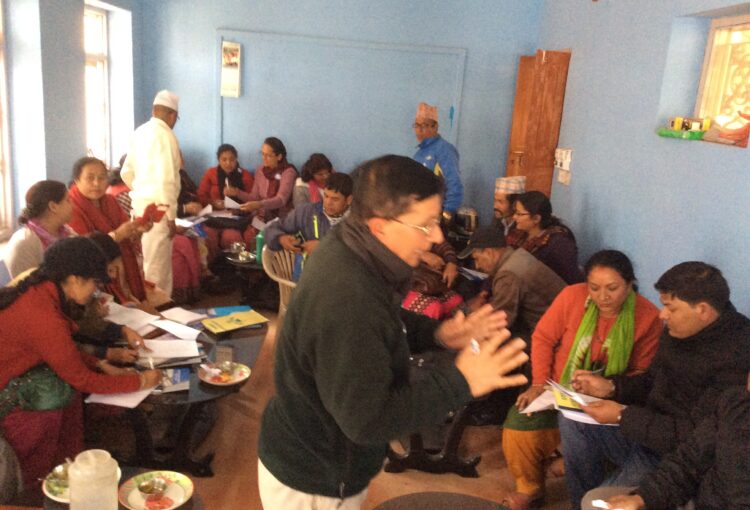
These enriching practices are clearly visible in GAN’s project areas, including Kathmandu, Lalitpur, Lamjung, and Surkhet.
In this fiscal year, due to the shift toward virtual learning, the Teachers’ Clinics were adapted to address new realities. The content was expanded to include discussions on school environment, sanitation, and digital competencies, in addition to the regular themes, ensuring continued support for teachers during blended and online teaching contexts.
3. Discovery Model Training
Gan Learning Centre organized discovery model training in collaboration with GAN and Pahar Trust Nepal. Rachel and James Fairways Learning Organization UK facilitate the workshop for teachers of Kathmandu valley. They used color blocks to discover the leadership pattern of each individual participants and share, learn from each other and improve their skills.
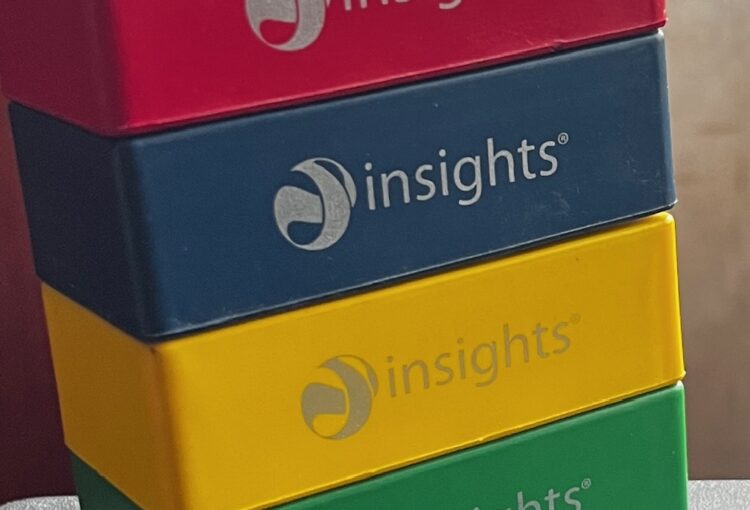
Discovery Model Training: A Personal and Professional Development Approach
Discovery Model Training is a structured approach to personal and professional growth that helps individuals explore and understand their own behavior, communication style, leadership traits, and interpersonal dynamics. It is widely applied in educational, organizational, and leadership development settings.
Though the term may be used in various contexts, it is often associated with color-coded personality profiling tools, such as those used by Fairways Learning Organization (UK) and inspired by frameworks like Insights Discovery.
4. Learning with Puppets
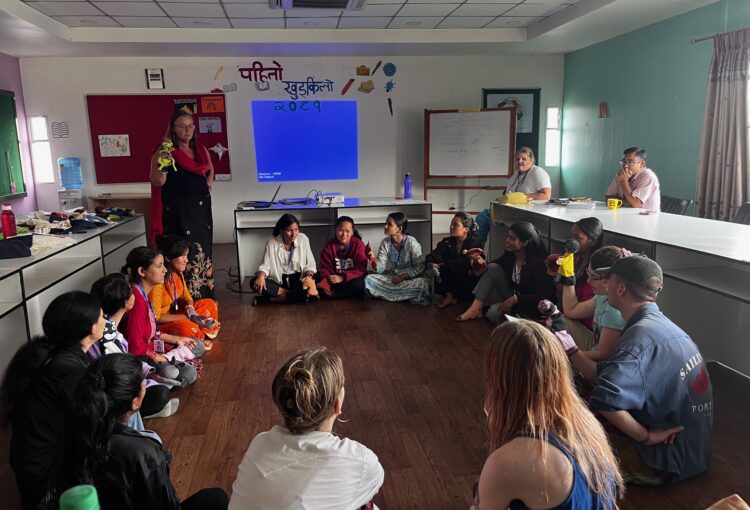
Visual and activity-based learning greatly enhances student engagement and comprehension. Puppetry is an effective and imaginative teaching tool that motivates students, especially in early grades, by combining storytelling, interaction, and creativity.
The “Learning with Puppets” session focused on using puppets as a dynamic method to make classroom learning more interactive and inclusive. The approach emphasized storytelling, group discussions, group work, interaction, brainstorming, and presentations to explore how teaching methods can be transformed through puppetry. The facilitator began the session with a storytelling
activity, encouraging teachers to observe and use what children naturally bring into the classroom—their ideas, language, and imagination. This was followed by:
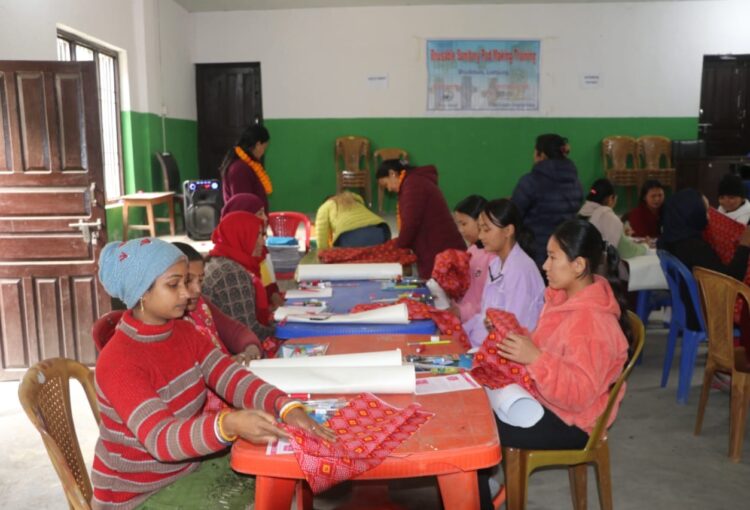
• Playing and learning language related to the story, showing evidence of language progress
• Exploring story content, encouraging students to think “outside the story box.
• In groups, developing cross-curricular content (e.g., linking the story to subjects like science, social studies, or art).
• Designing play-based activities connected to each subject, again showing evidence of both language development and subject
understanding.
• The training demonstrated how puppets can be integrated into teaching practices to enhance learning outcomes, promote creativity, and develop language and social skills in a fun and meaningful way.
Gender Equity, Disability and Social Inclusion (GEDSI) Orientation: Promoting Inclusive Education and Empowerment.
Social and disability exclusion, along with gender inequality, remain widespread challenges that significantly affect educational access and outcomes. These issues manifest through various forms of discrimination and exclusion within schools, including biases based on gender, physical and mental ability, aptitude, ethnicity, religion, and socioeconomic status. Education serves as the cornerstone of individual and societal development, and promoting equity and inclusion within the education system is a fundamental human right. To address these deep-rooted challenges, it is crucial that key education stakeholders possess a
strong understanding of gender equality, disability, and social inclusion (GEDSI)
principles. In the context of Nepal, it is particularly important to strengthen the capacities of
trainers and teachers in schools. Empowering them with the necessary knowledge and skills will enable them to foster inclusive
learning environments and promote equal opportunities for all learners, regardless of their background or abilities.
The Gan Research and Learning Resource Center facilitated a workshop on Gender Equality, Disability, and Social Inclusion (GEDSI) for the staff of Himalayan Trust, including managers, technical personnel, and teacher trainers. The objective was to build
a shared understanding of GEDSI principles and to ensure that education becomes truly inclusive and equitable for all—especially
those marginalized due to gender, disability, or socio-cultural backgrounds.
The workshop focused on:
• Deepening understanding of gender, disability, and social inclusion concepts
• Identifying and addressing barriers to inclusion within school environments
• Developing inclusive teaching and learning strategies
• Promoting GEDSI-responsive school policies and practices
Through this capacity-building initiative, participants gained essential knowledge and practical skills to advocate for and implement inclusive education at all levels.
Researchers Training
a. Youth Action Research
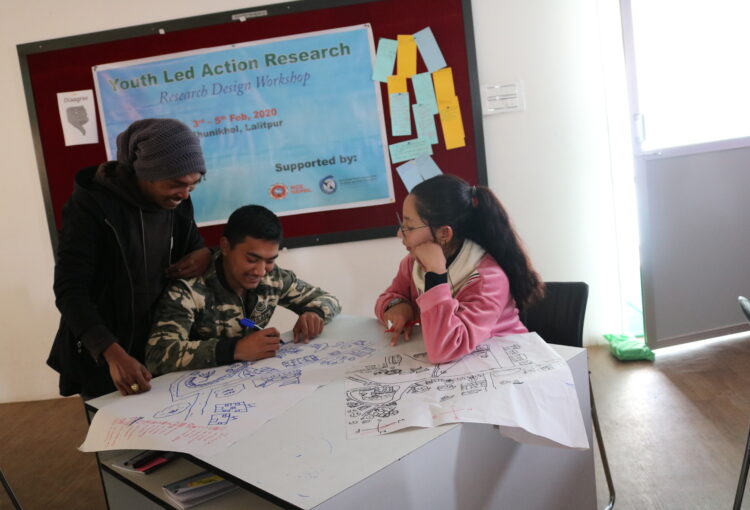
The training aimed to prepare local youth to conduct action research on school dropout, focusing on generating knowledge
about the situation of young people aged 10 to 24, both male and female, who left school before completing high school. Participants were equipped with mixed- method research skills and trained in the use of creative and participatory
approaches such as surveys, interviews, focus group discussions, and group reflections.
Through the process, the youth researchers themselves framed the research questions—exploring young people’s perceptions of early school dropout, alternative pathways out of poverty, and how these experiences intersect with social exclusion and discrimination.
The research to be conducted in the Bungamati and Pyangaun communities of Lalitpur District, Nepal, fostering both youth empowerment and community engagement in addressing a critical educational issue.
b. DWD Researchers’ Training
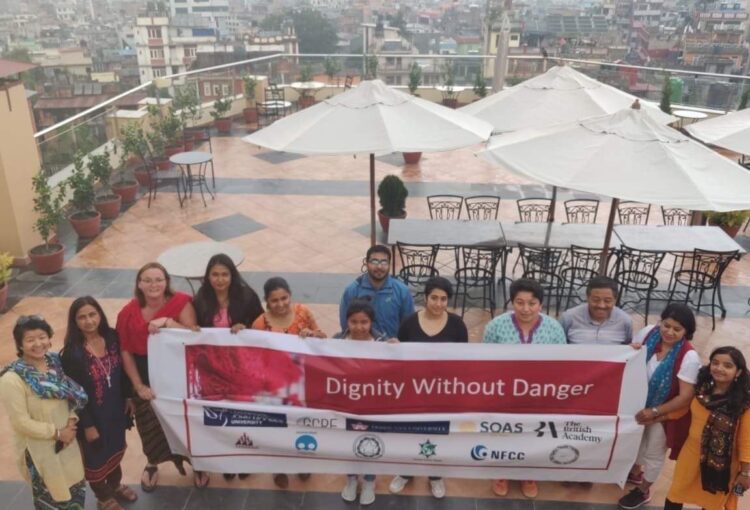
Series of training conducted by Prof. Dr. Sara Parker,Johnmoore University UK and Prof.Dr. Madhusudan Subedhi Tribhuwan University Kathmandu organized by Gan Research and learning Resource Centre.
Life skills training
Life skills training has been a highly demanded program among youth groups and children. The Centre has been offering these courses since its inception.
Self-Defense Training for Youth and Students
The Resource Centre has been actively conducting self-defense courses for youth and students across various parts of Nepal, including Lalitpur, Kathmandu, Surkhet, Kapilvastu, and Lamjung. These trainings are specifically designed to promote personal safety for girls and foster a safe and supportive learning environment.
The program goes beyond just physical defense techniques—it also helps participants develop
a deeper understanding of gender issues and equips them with the skills to navigate and respond to situations that may threaten their personal safety. The holistic approach ensures that girls are empowered not only physically but also mentally and emotionally to stand up for their rights and safety.
Reaction from the participants
Madhu Mahara. said, “Firstly, I would like to thank to organizers. Today onwards, I can defend myself for any sorts of circumstances in my daily life.” Niruta Rai said ” My confidence level increased so high. Tomorrow never comes, I can act right
now for good reason.” Bijeta Chaudhary said, “I have learnt to invest energy right now to gain multiple times of energy.”
Tara Ojha said , “I learned to be happy because I am
strong enough to defend myself.”
Formation of Provincial level coordination committee:
A “National Network for Girls Education” is formed consisting of representation from each province, and they have committed to work for the girls their safety and education
Information Communication Technology (ICT)
The integration of modern technology into classroom practices is essential to enhance teaching effectiveness and improve overall learning experience. By equipping teachers with digital literacy, they can confidently use ICT tools to make lessons more engaging
and impactful. Technology not only increases student participation through interactive and multimedia-based methods but also helps bridge the digital divide, ensuring that education aligns with global trends. Moreover, the use of diverse digital tools supports
inclusive education by addressing different learning styles and needs, allowing every student to benefit from the process. Building teacher capacity for online and blended learning has also become increasingly important, especially during times of crisis such
as pandemics or natural disasters, when traditional classroom teaching may not be possible.
Gan Centre covers the following courses for teachers or other groups of people
1. Basic ICT Skills: Introduction to digital tools, internet use, and online communication platforms.
2. Digital Teaching Tools: Use of interactive whiteboards, projectors, learning management systems (LMS), and e-learning platforms.
3. Educational Software & Apps: Training on subject-specific software, multimedia resources, and open-source learning tools.
4. Content Creation: Developing digital lesson plans, presentations, videos, and interactive activities.
5. Assessment Tools: Using digital platforms for quizzes, assignments, and tracking student progress.
6. Safe and Ethical ICT Use: Cybersecurity, digital citizenship, and responsible use of technology.
7. Blended & Online Learning: Strategies to integrate ICT into classroom teaching and remote learning.
Recently offered courses for Teachers from Budhanikantha/ Lalitpur municipality and online courses for over 300 teachers during COVID 19.
Some important tool kit for online classroom
| Resources Tool | Description |
| Padlet | Padlet is an online virtual “bulletin” board, where students and teachers can collaborate, reflect, share links and pictures, in a secure location. Padlet allows users to create a hidden wall with a custom URL. |
| Google Jamboard | Jamboard is one smart display. Quickly pull in images from a Google search, save work to the cloud automatically, use the easy-to-read handwriting and shape recognition tool, and draw with a stylus but erase with your finger – just like a whiteboard. Share ideas in brainstorms or lectures |
| Mentimenter | Mentimeter is a tool that enables people to have more efficient, interactive and fun meetings. It’s an easy-to-use, beautiful online tool for group interaction. It’s effortless to set up, fun to use and you get actionable results in real-time. Teachers can create a poll and create a quiz including giving feedback to the students. |
| Khan Academy | Khan academy is a great tool for empowering teachers. Khan Academy helps teachers to identify gaps in their students’ learning and it helps to modify and individualize in order to meet the needs of all students.
For students, Khan Academy is a wonderful resource for supplementing and studying the information taught in school. |
| Quizlet | Quizlet is an online flashcard resource where teachers and students can create flashcards for students to prepare for quizzes. There are also minigames for students to help remember the terms in the flashcard easier. Likewise, teachers can host activities for students can engage on and collaborate during class. |
| Nearpod | Nearpod is an application tool that takes presentations to a whole new level, essentially. Teachers can take already-existing PowerPoints or PDFs and upload them to the Nearpod site to create enriched multimedia presentations with interactive features. Some of the features include adding quizzes, drawing tools, and video to the lesson. Teachers can then share the content with the students and control the activity with the Nearpod app |
| Ed Puzzle | This app gives the teacher the power to take a video that they want to use for instruction and structure it to work for their lesson, and provide the instruction that the teacher desires. This allows the teacher to pull in a URL for a video, and then the teacher can structure how it is watched. The teacher can stop students from skipping to the end, add questions that the students need to respond to throughout the video, or voice over parts or the whole video. |
| Socrative | Socrative is a web-based assessment tool where instructors can create quizzes, get instant feedback from students and play games in the classroom. Socrative is different from other web-based assessment tools due to its feature of providing reports of the students and the class progression to the instructor. |
